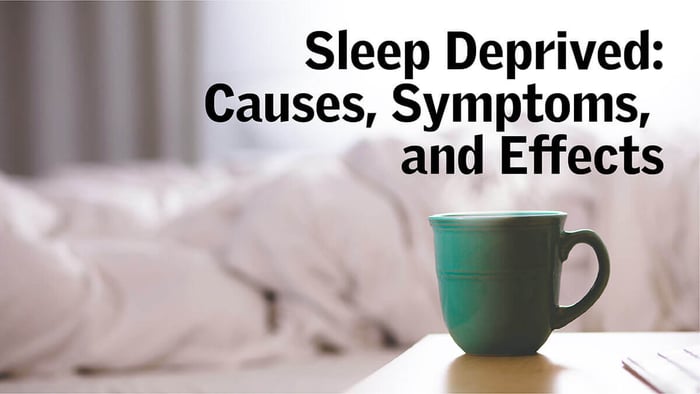It’s no secret that sleep deprivation is problematic. Most people know that they need adequate sleep for optimal health and functioning, but being chronically sleep deprived continues to be a problem for significant numbers of people. If you think you may be experiencing the effects of sleep deprivation, read on to learn about some of the causes, as well as sleep deprived symptoms and effects.
- Sleep Deprivation Causes
- Sleep Deprived Symptoms
- Long-Term Effects of Sleep Deprivation
- Coping with Sleep Deprived Symptoms
- Improve Sleep with a Weighted Blanket
Sleep Deprivation Causes
Sleep deprivation in and of itself is not a health condition, but rather a side effect of other problems or lifestyle habits. For instance, as people age, medications they are taking or health problems they have can interrupt sleep and lead to sleep deprivation. Conditions like schizophrenia, depression, chronic pain, cancer, and Alzheimer’s disease can contribute to sleep disturbances.
In some cases, a sleep disorder, such as insomnia or sleep apnea, can lead to a lack of sleep. Other times, life circumstances can get in the way of adequate sleep. This can include the birth of a baby, who keeps parents up at night for the first few months, or even years, of life. In other cases, shift work or busy schedules can lead to late nights and/or early mornings and cut into nighttime sleep. Regardless of the cause of sleep deprivation, it occurs when a person consistently gets less than the 7 to 8 recommended hours of sleep each night, which is what is generally accepted as the sleep deprived definition.
Sleep Deprived Symptoms
Those who are consistently getting inadequate amounts of sleep are likely to show some of the following sleep deprivation symptoms:
- Falling asleep extremely quickly at night, such as within 5 minutes
- Having difficulty concentrating
- Memory impairment
- Reduced physical strength
- More sicknesses due to difficulty fighting off infection
- Feeling drowsy during the day
Long-Term Effects of Sleep Deprivation
Sleep deprived effects can create significant problems over the long term. For example, being chronically sleep deprived can lead to unhealthy weight gain, as the research shows that people tend to consume more calories when sleep-deprived. In fact, the average person consumes 385 extra calories per day under sleep deprivation, which can lead to significant weight gain.
A review of the research has found that sleep deprivation, defined as sleeping fewer than seven hours per night, increases the aging of the heart. Additional consequences of sleep deprivation are as follows:
- High blood pressure
- Diabetes
- Stroke
- Metabolic syndrome
- High cholesterol
- Airway inflammation which can worsen asthma
- Cognitive decline, resulting in memory problems
- Emotional problems
Over time, lack of sleep can lead to mental health problems, as one recent study found that sleeping fewer than six hours per night was linked to frequent mental distress.
Coping with Sleep Deprived Symptoms
If you’re experiencing sleep deprived symptoms, it is important to find ways to cope and improve your sleep habits, to avoid the long-term negative health consequences of inadequate sleep. If your sleep deprivation is the result of schedule problems, it can be helpful to get on a consistent sleep schedule. Go to bed at the same time each day, and wake up around the same time each morning. Avoid watching late night television or scrolling through social media at night, and make it a priority to have the lights out early enough to ensure a full night of rest.
Other problems that could interfere with a good night of sleep include excessive caffeine use or an uncomfortable sleep environment. Limit your caffeine intake, especially after lunchtime, and make changes to your bedroom environment to promote optimal sleep. For example, if your bedroom is too warm at night, you may be tossing and turning, so it’s important to determine the ideal temperature for sleeping.
If a physical or mental health condition is interfering with your sleep, consult with your doctor about strategies for promoting optimal rest at night. Chronic stress from busy schedules or life changes can also be interfering with sleep. If this is the case, find ways to relieve stress, such as relaxation techniques or regular physical exercise.
A doctor can also help you to address underlying issues, like sleep apnea or insomnia, that can be interfering with adequate sleep. In some cases, a sleep study may be needed to determine why your sleep is so disrupted.
Improve Sleep with a Weighted Blanket
There are several potential causes, and solutions, for sleep deprivation. One solution, if the above methods do not work, is using a weighted blanket to relax the body and promote adequate sleep. Weighted blankets may promote comfort and relaxation among people who have health conditions like insomnia, restless leg syndrome, or fibromyalgia, all of which can make it difficult to get a good night of sleep.
If you think a weighted blanket may be the solution for your sleep deprived symptoms, an Aricove cooling weighted blanket could be the end of your sleep-related woes. We offer a weighted blanket for adults in varying weights, as well as a lighter weighted blanket that is appropriate for toddlers and children.


 United States (USD $)
United States (USD $)